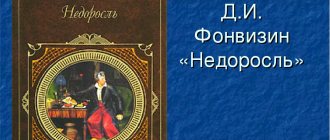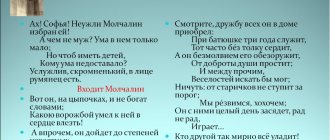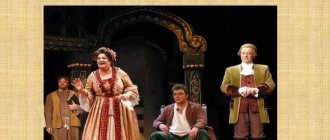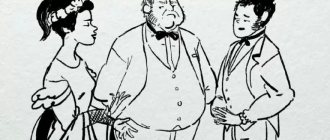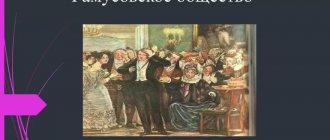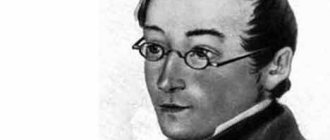The attitude of Chatsky and Famusov to ranks (quotes), to education, service
1 answer
Chatsky and Famusov, the heroes of the comedy “Woe from Wit” by A. S. Griboedov, are opposite heroes.
Throughout the play, they express opposing views on the education of the younger generation, service, ranks, intelligence and love. Their opinions on each topic can be presented in the form of a table with quotes: Attitude to service
“I would be glad to serve, but being served is sickening.” He wants to serve “the cause, the people.” He is disgusted to serve just for the sake of rank.
“And for me, no matter what it is, my custom is this: it’s signed, off your shoulders.”
He takes service lightly, serving only in order not to lose his place and to be significant in society.
“Ranks are given by people, but people can be deceived...”
“Uniform! one uniform! In their former life, he once covered, embroidered and beautiful, their weakness, their poverty of mind; And we follow them on a happy journey! And in wives and daughters there is the same passion for the uniform! ... "
Chatsky says that unworthy people often receive ranks.
“Be poor, but if he gets enough, two thousand family souls, he’s the groom.”
For Famusov, rank is everything. A person is judged not by his knowledge or merits, but by his place in society.
Attitude towards education
“Why, today, just like in ancient times, are they trying to recruit more teachers from regiments, at a cheaper price?”, “...we are ordered to recognize everyone as a historian and geographer.”
Chatsky notes that education does not give people knowledge - it exists only for fashion. That's why rich people hire teachers, but knowledge doesn't improve.
“They would take all the books and burn them,” “Learning is a plague, learning is the reason that now there are more crazy people, deeds, and opinions than ever before.”
For Famusov, education is the root of evil, so he believes that no one needs education.
Source
Brief information
Pavel Afanasyevich Famusov is a manager in a government office. He is a widower who is raising his only daughter Sophia. It is with the help of the image of the daughter that a vivid and accurate description of the character is given: “Grumbling, restless, quick.”
In the comedy of A. S. Griboyedov, this character occupies an important place in the system of images. Famusov is a representative of the “past century,” which comes into sharp conflict with the “present century,” of which Chatsky is a representative. The main character speaks of Famusov’s character as follows: “A sycophant and a businessman.”
To understand the essence of generational contradictions, the quotation characterization of the image is important.
Famusov's views (quotes)
1 answer
Attitude towards the people and serfdom:
Famusov is a defender of the old century, the heyday of serfdom.
Attitude to ideals:
Famusov’s ideal is a nobleman of the Catherine century, “hunters of indecency.”
Attitude to education:
Famusov opposes books and sees harm in teaching.
Service attitude:
Sees service to individuals rather than to a cause as a source of personal benefits.
Attitude towards foreigners:
He treats everything folk and national with disdain, slavishly imitates the external culture of the West, especially France, neglecting his native language.
Attitude to wealth and rank:
Evaluates a person by his origin and the number of serf souls. The opinion of aristocratic society is sacred and infallible.
Attitudes towards love, marriage, happiness:
Love is a pretense, a marriage of convenience.
Rating: 4.5 (10 votes)
Positive features
The reality is confirmed by adjacent negative and positive personality traits.
Good nature.
Pavel Afanasyevich’s attitude towards Chatsky characterizes him positively. After the death of Chatsky’s father, Famusov took him into his house and began to raise him as a son. Only a kind and caring father of the family, a true friend, could do this. This is how he is presented in relation to his daughter and childhood friend. Good feelings are also visible in relation to some courtiers, to secretary Molchalin.
Hospitality.
Many scenes confirm this quality of Famusov: Chatsky’s arrival, the ball, Skalozub’s arrival. You just need to understand that hospitality in the house is only for the rich. There is no place for the poor and ignorant.
Love for the past.
All old people cherish past events in their memory. The owner of the house protects the past and is afraid of criticism. Everything that has passed is his fate. Preserving the past is the task of his generation.
Do you know the answer?
Items
New questions
Site rating
- 1. Alexander S 445
- 2. Daniil Vasiliev 385
- 3. Daria Zavgorodnyaya 217
- 4. Igor Proskurenko 145
- 5. Isabella Bevz 136
- 6. Herodotus Abazbek 127
- 7. Vladimir Kuntin 106
- 8. Anton Kovalevich 98
- 9. Nastya Nikitina 95
- 10. Niya B 94
- 1. Kristina Volosocheva 19.120
- 2. Ekaterina 18,721
- 3. Yulia Bronnikova 18,580
- 4. Darth Vader 17,856
- 5. Alina Saibel 16,787
- 6. Igor Proskurenko 15,876
- 7. Maria Nikolaevna 15,775
- 8. Larisa Samodurova 15,735
- 9. Liza 15,165
- 10. TorkMen 14,876
The most active participants of the week:
- 1. Victoria Neumann - bookstore gift card for 500 rubles.
- 2. Bulat Sadykov - bookstore gift card for 500 rubles.
- 3. Daria Volkova - bookstore gift card for 500 rubles.
Three lucky people who passed at least 1 test:
- 1. Natalya Starostina - bookstore gift card for 500 rubles.
- 2. Nikolay Z - bookstore gift card for 500 rubles.
- 3. David Melnikov - bookstore gift card for 500 rubles.
The cards are electronic (code), they will be sent in the coming days via VKontakte message or email.
Source
Negative personality traits
Grouchiness.
The nobleman, the owner of the house, behaves like a bourgeois. He gets angry to no avail and is often in a mood when he is dissatisfied with everything. He is in a hurry, grumbling and scolding the courtiers. It’s surprising that the man himself knows about this property. But this only gives him a lot of pleasure. It seems that scolding is his normal state.
Coarseness.
In dealing with those who serve him, the owner of the house does not mince words. Such rudeness was characteristic of all nobles of the conservative part of society. Rudeness and power in this case are synonymous. For Famusov, servants are donkeys, blockheads, lazy grouse. Rudeness disappears when Famusov is surrounded by people of his circle or higher status. There is very poise and modesty here.
Loud intonations.
The owner's loudness frightens the residents. You can hear it everywhere. The voice is compared to trumpets. The master does not try to speak quietly. His position: I am the owner and have the right to shout.
Crazy.
A father can do such things that he is called crazy. Famusov is a true representative of the ruling part. Choosing expressions and changing behavior is not in his rules.
Flattery.
Pavel Afanasyevich flatters and is ready to please those from whom benefit is possible. Several scenes of his conversation with Colonel Skalozub provide a clear example of this behavior: changes in posture, speech and manner of speaking.
False entrepreneurship.
In Famusov’s time, this quality was called differently - a businessman. Any means are good to achieve your goals. He will do everything that will help him achieve the desired rank and reward.
Do you know the answer?
Items
New questions
Site rating
- 1. Alexander S 742
- 2. Daniil Vasiliev 450
- 3. Daria Zavgorodnyaya 225
- 4. Igor Proskurenko 184
- 5. Isabella Bevz 136
- 6. Herodotus Abazbek 127
- 7. Karina Mirai 111
- 8. Vladimir Kuntin 106
- 9. Anton Kovalevich 98
- 10. Nastya Nikitina 95
- 1. Kristina Volosocheva 19.120
- 2. Ekaterina 18,721
- 3. Yulia Bronnikova 18,580
- 4. Darth Vader 17,856
- 5. Alina Saibel 16,787
- 6. Igor Proskurenko 15,914
- 7. Maria Nikolaevna 15,775
- 8. Larisa Samodurova 15,735
- 9. Liza 15,165
- 10. TorkMen 14,876
The most active participants of the week:
- 1. Victoria Neumann - bookstore gift card for 500 rubles.
- 2. Bulat Sadykov - bookstore gift card for 500 rubles.
- 3. Daria Volkova - bookstore gift card for 500 rubles.
Three lucky people who passed at least 1 test:
- 1. Natalya Starostina - bookstore gift card for 500 rubles.
- 2. Nikolay Z - bookstore gift card for 500 rubles.
- 3. David Melnikov - bookstore gift card for 500 rubles.
The cards are electronic (code), they will be sent in the coming days via VKontakte message or email.
Source
What Famusov Says About Chatsky Quotes
1 answer
The full name of the hero is Alexander Andreevich Chatsky:
“...Alexander Andreevich Chatsky...”
Alexander Chatsky - nobleman, landowner with 300-400 serfs:
“- had three hundred souls. - Four hundred, please understand...”
Chatsky is a single man. He is still young, but no longer “falls into childishness”:
“...Yes, I’m not married...” “...Now I can’t fall into this childish behavior...”
Chatsky is a lonely man. His mother and father died when he was a child. Chatsky’s father was a friend of Famusov:
“...Here you go – Chatsky, my friend, / Andrei Ilyich’s late son...”
“...Chatsky, my friend, / Andrei Ilyich...”
After the death of his parents, Chatsky was brought up in Famusov's house. Having matured, he began to live separately:
“...Yes, with Chatsky, it’s true, we were brought up and grew up; / The habit of being together every day inseparably / Tied us with childhood friendship...”
“...but then / He moved out, he seemed bored with us, / And rarely visited our house...”
Chatsky has been friends with Sofia Famusova since childhood and has loved her for a long time:
“...I remember you often danced with him as a child...”
“...And yet I love you madly...”
At the beginning of the play, Chatsky returns to Moscow after 3 years of “wandering around the world”:
“...I haven’t written two words for three years! / And suddenly it burst out as if from the clouds...”
“...The desire to wander attacked him...”
Chatsky is a member of the English Club, which consists of rich, noble nobles:
“...Then, think, a member of the English Club...”
Alexander Chatsky is a smart, witty man:
“...Oster, smart, eloquent...”
“...he’s a smart guy / And he writes and translates nicely. // You can’t help but regret that with such a mind...”
Chatsky is an eloquent person:
“...What does he say! and speaks as he writes. ”
Alexander Chatsky likes to make jokes and “tease” people, but he does not do this with the intention of harming:
“...and cheerful and sharp...”
“...Listen, are my words really all caustic words? / And tend to harm someone. ”
“...Not a person, a snake. ” (Sofia about Chatsky)
Chatsky is a mocking person, but his ridicule is always directed against stupid and narrow-minded people:
“...He knows how to make everyone laugh nicely; / Chatting, joking..."
“...Look at you for laughs, Chatsky will make you laugh...”
“...It’s noticeable that you are ready to pour out bile on everyone...”
“...A hail of your barbs and jokes will break out. / Tell jokes! and joke forever! How will you react to this? ”
“...Ah, Chatsky! You love to dress everyone up as jesters...”
Chatsky often talks to others in a harsh tone:
"…Yes! a menacing look, and a harsh tone, / And there are an abyss of these features in you...”
According to Sophia, Chatsky is intemperate in his tongue and too openly despises people:
“Why should there be, I’ll tell you straight,
So I will not control my tongue?
In contempt for people so openly?
Chatsky is a proud man, “proud,” according to Famusov:
“That's it, you are all proud. ”
Alexander Chatsky is a free-thinking person, for which Famusov calls him a “Carbonari” and a “Jacobin”:
"…Oh! My God! he is a Carbonari*. ” (*that is, revolutionary)
“...I think he’s just a Jacobin*...” (*that is, a freethinker)
Chatsky is an independent person. He does not want to depend on others, such as Molchalin:
Molchalin: After all, you have to depend on others.
Chatsky: Why is it necessary?
Chatsky quit military service and also decided not to serve as an official. Among the nobles, it was customary to choose one of these two employment options, but Chatsky does not engage in either one or the other:
Natalya Dmitrievna. Yes, I was traveling and recently returned.
According to Chatsky, nobles should not limit themselves only to bureaucratic or military service. He believes that an intelligent person can also find himself in creativity or science:
“Of the young people, there will be an enemy of quest, // Without demanding either a place or promotion to rank, // He will focus his mind on science, hungry for knowledge; // Or God himself will arouse the heat in his soul // To the creative, lofty and beautiful arts...”
Chatsky is a sincere person, not a pretender:
“…Once in my life I’ll pretend…”
Alexander Chatsky loves the truth:
“...Why should I deceive myself. ”
“...Why didn’t they tell me directly...”
Chatsky is a sensitive person:
“...Who is so sensitive, and cheerful, and sharp, / Like Alexander Andreich Chatsky. ”
Alexander Chatsky is a passionate, ardent person:
“...that passion? that feeling? that ardor.
“...But what is boiling inside me now, worries me, infuriates me, / I wouldn’t wish it on my personal enemy...”
Chatsky has his own opinion about everything:
“...Why are other people’s opinions only sacred? ”
Alexander Chatsky is a patriot. He loves the Russian people and Russia:
“...So that our smart, cheerful people...”
In high society, Chatsky is considered crazy because of his freethinking and liberal views:
“...You glorified me as crazy with the whole choir...”
Chatsky does not like the “human crowd” and the Moscow Famus society. At the end of the play he leaves Moscow:
“...And in the crowd I am lost, not myself. / No! I am dissatisfied with Moscow..."
“...Get out of Moscow! I don't go here anymore. / I’m running, I won’t look back, I’ll go searching around the world...”
Attitude to upbringing (Woe from Wit), to education, quotes
1 answer
1. Attitude to wealth, to ranks
Chatsky does not attach much importance to them.
Famus society - considers wealth and status to be the most important in a person. For example, Famusov will never give his daughter to a poor man.
2.Attitude towards the service
Chatsky would like to “serve the cause, not individuals,” but this is impossible. He does not accept careerism and does not want to “serve.”
Famus Society - Believes that all means are good for career advancement and receiving awards.
3. Attitude towards foreigners
Chatsky - ridicules the admiration for everything foreign.
Famus society - they consider foreign things to be obviously better than Russian ones (they hire foreign tutors, buy foreign goods and even speak a foreign language (French) among themselves)
4.Attitude towards education
Chatsky - considers a good education vital.
Famus society - they consider education not only unnecessary, but even harmful “learning is the plague, learning is the reason...”
5.Attitude towards serfdom
Chatsky ardently condemns.
Famus society takes it for granted.
6. attitude towards Moscow morals and pastimes
Chatsky - ridicules the idleness of the Moscow nobility and the conservative morals of local society.
The Famus Society believes that everything is as it should be.
7. attitude towards nepotism, patronage
Famus society considers this normal and correct.
8.attitude towards freedom of opinion
Chatsky believes that everyone has the right to freely express their thoughts - and he does so himself.
Famus society is afraid of dissent, considers it dangerous.
9.attitude towards love
Chatsky takes love seriously. Loves Sophia.
Famus society considers love a whim, marriages are concluded for convenience.
Chatsky takes them seriously. Chatsky traveled a lot, read and, like the progressive noble youth of the 19th century, probably thought a lot about how he sees an ideal society and what does not suit him about the existing one.
Famus society - they think only about money and status. They do not consider it necessary to do anything to improve their contemporary society - on the contrary, they want to keep everything as it is.
Source
The attitude of Famus society to the people, ideals, serfdom, service (quotes)
1 answer
1. Attitude to wealth, to ranks
“Be poor, but if you get enough, two thousand family souls, that’s the groom”
2.Attitude towards the service
“And for me, no matter what’s the matter, what’s not the matter, my custom is this: it’s signed, then off your shoulders.”
3. Attitude towards foreigners
“The door is open for those invited and uninvited, especially for foreigners. »
4.Attitude towards education
“They would take away all the books and burn them,” “Learning is a plague, learning is the reason that now, more than ever, there are more crazy people, deeds, and opinions.”
5.Attitude towards serfdom
The Famusov society is the defenders of the old century, the heyday of serfdom.
6.attitude to Moscow morals and pastime
“I’m called to Praskovya Fedorovna’s house on Tuesday for trout,” “On Thursday I’m called to a funeral,” “Or maybe on Friday, or maybe on Saturday, I have to baptize at the widow’s, at the doctor’s. »
7.attitude towards nepotism, patronage
“When I have employees, strangers are very rare, more and more sisters, sisters-in-law and children.”
8.attitude towards freedom of opinion
“Learning is the plague, learning is the cause. What is worse now than in the past, there are crazy people, deeds, and opinions.”
9.attitude towards love
“Be bad, but if there are two thousand family souls, that’s the groom.”
Famusov’s ideal is a nobleman of the Catherine century, “hunters of indecency.
Source
